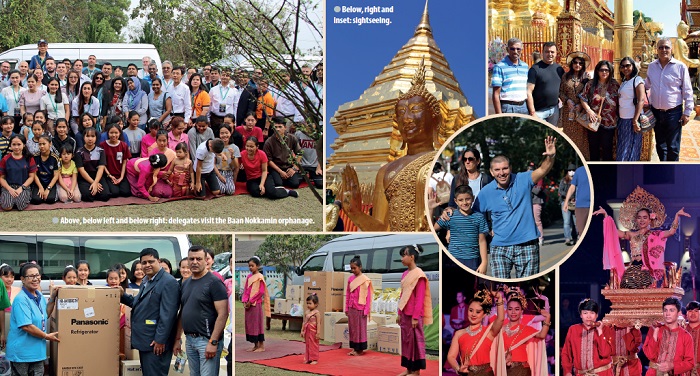A report from the unique ARA conference set in the mountains of Thailand, by Steve Jordan.

It was the first time I had been invited to the ARA conference. Thank you chaps for having me along. Some might say that all moving conferences are the same, but they are not. They are all subtly different and the differences are driven by the people.
ARA stands for the Asian Relocation Association. Just so you know, they don’t spell out the letters, they call it ‘Arrah’ which makes it sound a bit as if they should all be wearing pirate hats and carrying parrots on their shoulders … but they don’t.
ARA, however you choose to pronounce it, was started in 2008 by a group of just nine moving and relocation companies. Today, despite the rather unfortunate timing of its launch, just as the global financial crash hit the world, its ranks have swelled to around 85 companies. Its purpose was to bring together the independent companies of the Asian region to work more closely with each other for their mutual benefit. The conference is their flagship event giving an annual opportunity to renew the already close friendships and talk some business.
The conference took place in Chiang Mai in northern Thailand. While the city shares much of its characteristics with many others in Asia – often somewhat run down and dusty; roads a steady stream of twist ‘n’ go Hondas, sometimes carrying entire families, with or without helmets; and the ubiquitous exposed power and telecoms lines following your every movement and interrupting every view – it’s undoubtedly interesting and has some delightful spots. Chiang Mai was founded around 800 years ago as a cultural and religious centre and still retains a complete protective moat, with floating giant water lilies and cascading flowers, that encircles the remains of its ancient protective walls. It’s also hard to miss the hundreds of Buddhist temples that stand in celebration of a devout community.
Chiang Mai is a little gentler than its much larger capital, Bangkok: the smiles of the people as warm as they are genuine. At 300 metres above sea level it’s also a little cooler, a welcome feature for those used to a more temperate climate.
The venue was the Shangri-la hotel, an aptly-named haven of peace in a bustling city of 130,000 people. As might be expected in Thailand, the service was impeccable, the hotel immaculate and the food exquisite. ARA makes no excuse for mixing business with pleasure and does not hide its aim to build friendships first with commerce being an inevitable and necessary sequel. Its one business session over the three days was held behind closed doors and I didn’t enquire as to its subject matter: privacy is an entitlement when requested. What I do know is that virtually all 50+ delegates took part and Chairman Sudeep Shah from Orient Freight Group in Nepal would have presided over proceedings as he does everything else, with his unique wit and charm softening the essential formality and efficiency that ensures things get done.
As has become customary at many industry conferences ARA did its bit to help the local host community. The entire delegation headed off by bus to the Baan Nokkamin orphanage to which it had donated, in a gesture that was as practical as it was magnanimous, goods specifically requested by the principals: these included a refrigerator, fans to cool the summer heat and rice. The ARA Board also distributed boxes of sweets to all the children and staff. In return the children performed a charming, traditional dance which beguiled hearts and raised smiles.
Day two was reserved for sight-seeing with buses and guides organised to take delegates into the cooler mountains to visit both the gardens of the royal Bhuping Place, famous for its roses; and the Wat Phra That Doi Suthep temple which was built in the 14th Century to house the relics of the Lord Buddha, the location said to have been chosen by a white elephant, sacred in Thailand.
The ARA conference was notable as much for what it omitted as what it included. There was no golf competition and no scheduled one-to-one or satellite meetings ensuring that the entire group stayed together much of the time. It was not overly expensive either despite including three excellent dinners (two off site) which, again, kept the group together rather than letting people drift off; friendship and relationship building being paramount throughout. Nor was alcohol a particular feature of ARA, unlike many other meetings. There was plenty to drink for anyone who wanted it, but the culture was different and so the bar-room chatter was not so prominent; it made for fresher-than-usual faces every morning.
Membership of ARA is at the Board’s discretion and the organisation is encouraging new members, of the correct calibre, to join. Applicants must already be members of IAM (International Association of Movers), must have appropriate transport and warehousing facilities, should have been trading for at least three years and must be of good repute and financial standing. The people I spoke to all said that they valued their membership for the business exchanged and the industry knowledge gained, but mainly for the friendships they had made through this smaller group that provided quality time with each other that is difficult or impossible at larger gatherings.
So no, the ARA conference is not like all the others; it’s different and greatly valued by all who take part. The moving business is about people and it is the people at ARA that create its unique style. Click here to see the video.

Photos: The Baan Nokkamin orphanage and sight-seeing.
Click here to read the next editor's pick.